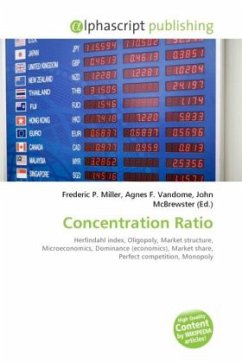
Market Concentration and Banking Performance in Nigeria
Evidence From the Industry Data
Versandkostenfrei!
Versandfertig in 6-10 Tagen
27,99 €
inkl. MwSt.

PAYBACK Punkte
14 °P sammeln!
Commercial banks are widely recognized as financial institutions that mobilize, allocate, and invest much of every economy savings. Conversely, their activities have substantive repercussions on capital allocation, firm growth, industrial expansion, and economic development. In recent years, the consolidation of banks around the globe has intensified public debates on the influences of market concentration on banking performance. In Nigeria, the CBN 2005 consolidation policy and recapitalization policy as well as post-consolidation reforms have not only led to reduction in the numbers of comme...
Commercial banks are widely recognized as financial institutions that mobilize, allocate, and invest much of every economy savings. Conversely, their activities have substantive repercussions on capital allocation, firm growth, industrial expansion, and economic development. In recent years, the consolidation of banks around the globe has intensified public debates on the influences of market concentration on banking performance. In Nigeria, the CBN 2005 consolidation policy and recapitalization policy as well as post-consolidation reforms have not only led to reduction in the numbers of commercial banks but has also ensured re-alignment of market shares from the "traditional big three" and banking quality. Thus, its implication over banking performance was examined using ten commercial banks listed on the Nigerian Stock Exchange market within the period of 1998-2010. It was observed that the industry is static and collusive in nature, mainly driven by minimum capital base and not service rendered and/or technological innovation, which have led to low rate of entry and high exit. The study provides policy implications based on the outcomes that could move the industry forward.












